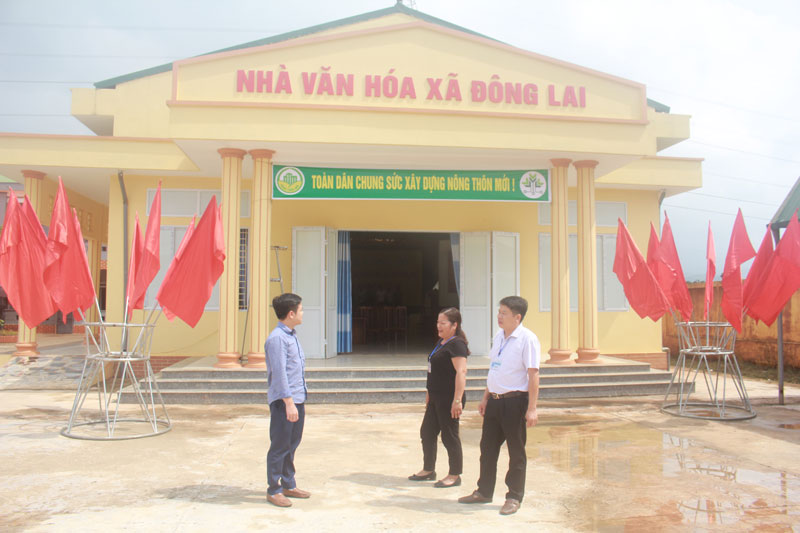
(HBO) – From a poor locality with limited infrastructure, an agriculture-based economy, low per capita income and a high poverty ratio, Dong Lai commune in Hoa Binh’s Tan Lac district has witnessed considerable progress after nine years of implementing the National Target Programme on New-Style Rural Area Building. So far, the commune has completed all 19 criteria of the programme, while living conditions of local residents have significantly improved.
 The Central Culture House of Dong Lai commune has been built to meet
the criteria of a new-style rural area and the demands of local residents and
officials.
The Central Culture House of Dong Lai commune has been built to meet
the criteria of a new-style rural area and the demands of local residents and
officials.
So far, the commune has mobilized
over 51 billion VND (2.19 million USD) for the programme, of which 10.5 billion
VND was contributed by local residents in the form of cash, work, land and
other assets.
Local infrastructure has been
upgraded, while the socio-economic situation in the commune has improved. Currently,
62 percent of inter-field and 55 percent of inter-village roads have been paved,
and all households have access to clean water, while schools in the locality
have been standardized.
A new culture house of the
commune has been built, along with culture houses in every village. Up to 96
percent of locals have joined health insurance.
The improved infrastructure has
created favourable conditions for locals to develop their economic conditions
and reduce the poverty ratio. Many households have switched cultivation strategy
from rice to other crops with higher value.
The commune now has 75 hectares
of lemongrass and more than 200 hectares of citrus trees. The per capita income
among locals has risen to 32.3 million per year from 21 million VND in 2011,
while the poor household ratio has reduced to 11.3 percent.
Bui Van Su, Chairman of the Dong
Lai People’s Committee, said that during the implementation of the programme,
the commune has received donations of 42,400 sq.m of land from more than 1,000
households.
He attributed the result to the
transparent and democratic way the programme has been implemented. Local
residents have become major contributors to the construction of infrastructure
that directly benefit them, he said, stressing the pioneering role of local
officials and Party members./.
In Hoa Binh province, 11 traditional craft villages with more than 400 small-scaled production households have put in place a clean and green production model, establishing new standards for sustainable development. Waste collection sites and wastewater treatment facilities have been meticulously managed by local residents.
To make it easier for the residents to handle administrative procedures, Yen Bong Commune (Lac Thuy District) has identified the administrative reform as one of its key tasks. By implementing a range of synchronized solutions, the commune has seen the positive changes in the administrative reform, meeting the needs of its people.
Mai Chau district has firmly established itself as a standout destination on Vietnam’s tourism map, attracting both domestic and international visitors with its breathtaking landscapes, rich ethnic culture, and warm hospitality. However, beyond its natural and cultural charm, a secure and well-managed tourism environment has added to Mai Chau’s appeal.
As Vietnam enters a new phase of economic and administrative reform in 2025, Hoa Binh province is stepping up its efforts to streamline governance, boost economic growth, and attract investment.
The Hoa Binh provincial People's Committee held its monthly meeting on March 26 to review the progress of key projects, assess budget revenue and public investment disbursement, provide feedback on draft documents for submission to the provincial Party Committee's Standing Board, and discuss other important matters related to the committee's governance activities.
Playing a key role in Hoa Binh province’s economic development, Luong Son district has been focusing on science and technology development, innovation, and digital transformation.



 The Central Culture House of Dong Lai commune has been built to meet
the criteria of a new-style rural area and the demands of local residents and
officials.
The Central Culture House of Dong Lai commune has been built to meet
the criteria of a new-style rural area and the demands of local residents and
officials.